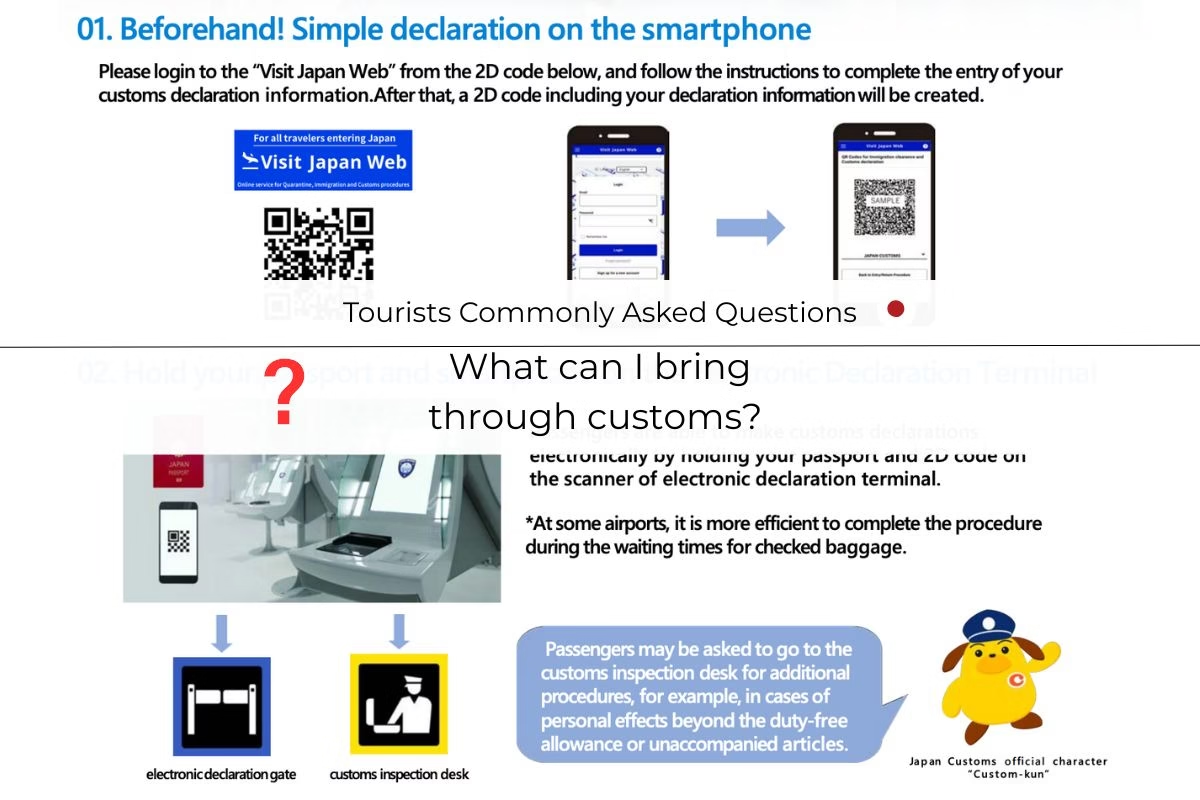What Can I Bring Through Customs?
When traveling to Japan, you may ask ‘What can I bring through customs’. Therefore, understanding the Japan’s customs regulations ensures that you won’t face any surprises at the airport. Japan is known for its strict customs policies, designed to keep the country safe and its ecosystems protected. But don’t worry—while there are a few restrictions, the process is straightforward as long as you’re mindful of what you’re bringing into the country.

Let’s dive into the questions – ‘What Can I bring through customs?’
- Personal Items and Duty-Free Goods
You can bring in personal items like clothing, laptops, and cameras without any issues. These items are considered for personal use and not for sale, so they generally don’t attract any customs duty. If you’ve purchased duty-free goods, such as alcohol or cigarettes, Japan allows you to bring in up to:
- 3 bottles of alcohol (up to 1 liter each)
- 200 cigarettes (or 50 cigars)
These limits are pretty generous, but anything over the allowed amount will be subject to taxes or penalties.
- Food and Agricultural Products
While Japan offers a culinary paradise, it also has some of the strictest food import rules to prevent diseases or pests from entering the country. Fresh fruits, vegetables, and meats are generally prohibited, especially from countries where there are risks of disease outbreaks (like foot-and-mouth disease or mad cow disease). However, you can bring in packaged snacks or processed food like instant noodles, canned goods, or chocolates without much hassle.
If you’re unsure about a particular item, it’s best to check the Japanese customs website before you travel. But in general, anything that has been pre-packaged and commercially processed is fine.
- Prescription Medications
If you’re traveling with medication, Japan is very particular. Certain drugs that are legal in your home country might be illegal in Japan, especially those containing ingredients like pseudoephedrine (common in cold medications) or stimulants. To bring in prescription drugs, you must carry the original prescription and, if applicable, a certificate from your doctor. For any over-the-counter medications, it’s a good idea to check with the Japanese embassy or consulate beforehand to ensure they’re allowed. If you’re bringing in large quantities, you may need a Yakkan Shoumei (import certificate), which is required for any medications that exceed a 1-month supply.
- Cultural Artifacts and Antiques
Japan has very strict rules about bringing in certain cultural artifacts, particularly items related to historic heritage. If you’ve purchased antique artwork, wooden statues, or anything of historical value while abroad, make sure to declare them at customs. Failure to do so can result in the confiscation of the items or fines. To avoid issues, always check with the vendor to see if special paperwork or permission is needed.
- Plants, Animals, and Wildlife Products
Japan’s biodiversity is protected fiercely, so if you’re bringing in any plants, seeds, or animal products, there are very strict regulations. Fresh flowers, seeds, fruits, and soil are all generally prohibited to avoid the spread of pests or diseases that could harm local ecosystems. The same applies to animal products, including furs, skins, and ivory. However, natural goods like wooden carvings or shell jewelry may be permitted, but again, it’s wise to declare them and confirm any necessary documentation.
- Prohibited Items
For ‘What can I bring through customs?’ – these are important information to note. There are also a few things that are absolutely prohibited in Japan. These include drugs, weapons, and counterfeit goods. Possession of even a small amount of illegal drugs can lead to serious consequences, including detention or deportation. Also, be cautious about counterfeit branded goods—Japan has stringent intellectual property laws, and bringing in fake designer items can lead to confiscation and fines.
- Cash and Currency
Japan doesn’t impose restrictions on the amount of cash you can bring into the country. However, if you’re carrying over 1 million yen (approximately $7,000 USD), you must declare it. This rule is in place to comply with anti-money laundering laws. In general, Japan is a cash-centric society, so travelers might find it useful to bring in cash, especially for visits to traditional shops, small eateries, or outlying areas where credit cards aren’t always accepted.
- Gifts and Souvenirs
Bringing in gifts or souvenirs for family and friends is one of the most exciting parts of your trip to Japan. Whether it’s kimonos, artworks, or traditional ceramics, you’ll find plenty of beautiful things to bring home. Just remember, anything that looks like a cultural artifact, especially antiques, might require additional checks or documentation. Souvenirs like tea sets or chopsticks are generally safe, but always keep receipts on hand in case you need to prove their value or origin.
Final Thoughts
Japan’s customs rules might seem strict, but they’re primarily designed to protect the country’s environment, culture, and public health. If you’re aware of the restrictions and ensure that your items are legal, there’s little to worry about. From the question ‘What can I bring through customs?’ – The key is always to declare items that might be questionable and check ahead of time if you’re unsure. Japan is a country that welcomes visitors, and with a little preparation, you can enjoy your travels without any customs hiccups. You may also like to find information on new Japan tourist visa requirements.


